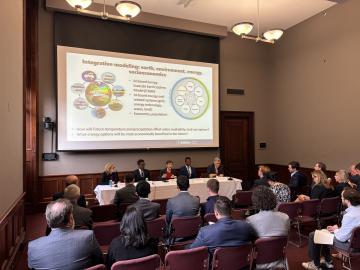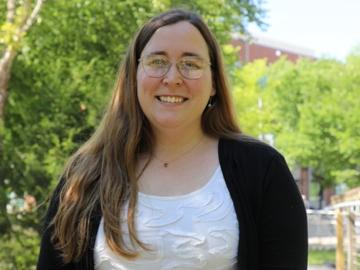
Filter News
Area of Research
- Advanced Manufacturing (1)
- Biology and Environment (38)
- Biology and Soft Matter (1)
- Computational Biology (1)
- Computer Science (2)
- Energy Science (23)
- Fusion and Fission (2)
- Isotopes (1)
- Materials (22)
- Materials for Computing (6)
- National Security (17)
- Neutron Science (12)
- Nuclear Science and Technology (3)
- Quantum information Science (1)
- Supercomputing (64)
News Type
News Topics
- (-) Computer Science (111)
- (-) Cybersecurity (14)
- (-) Exascale Computing (51)
- (-) Materials Science (55)
- (-) Mercury (7)
- 3-D Printing/Advanced Manufacturing (56)
- Advanced Reactors (12)
- Artificial Intelligence (77)
- Big Data (45)
- Bioenergy (68)
- Biology (80)
- Biomedical (42)
- Biotechnology (25)
- Buildings (30)
- Chemical Sciences (35)
- Clean Water (16)
- Composites (11)
- Coronavirus (19)
- Critical Materials (5)
- Education (2)
- Emergency (3)
- Energy Storage (32)
- Environment (116)
- Fossil Energy (6)
- Frontier (44)
- Fusion (38)
- Grid (32)
- High-Performance Computing (81)
- Hydropower (6)
- Isotopes (33)
- ITER (4)
- Machine Learning (37)
- Materials (51)
- Mathematics (8)
- Microelectronics (3)
- Microscopy (23)
- Molten Salt (2)
- Nanotechnology (17)
- National Security (60)
- Neutron Science (82)
- Nuclear Energy (66)
- Partnerships (36)
- Physics (34)
- Polymers (9)
- Quantum Computing (35)
- Quantum Science (48)
- Security (16)
- Simulation (42)
- Software (1)
- Space Exploration (13)
- Statistics (2)
- Summit (40)
- Transportation (30)
Media Contacts

A team of researchers used the Frontier supercomputer and a new methodology for conducting a genome-wide association study to earn a finalist nomination for the Association for Computing Machinery’s 2024 Gordon Bell Prize for outstanding

A multi-institutional team of researchers led by the King Abdullah University of Science and Technology, or KAUST, Saudi Arabia, has been nominated for the Association for Computing Machinery’s 2024 Gordon Bell Prize for Climate Modelling.

Researchers led by the University of Melbourne, Australia, have been nominated for the Association for Computing Machinery’s 2024 Gordon Bell Prize in supercomputing for conducting a quantum molecular dynamics simulation 1,000 times greater in size and speed than any previous simulation of its kind.

Biochemist David Baker — just announced as a recipient of the Nobel Prize for Chemistry — turned to the High Flux Isotope Reactor (HFIR) at Oak Ridge National Laboratory for information he couldn’t get anywhere else. HFIR is the strongest reactor-based neutron source in the United States.

To bridge the gap between experimental facilities and supercomputers, experts from SLAC National Accelerator Laboratory are teaming up with other DOE national laboratories to build a new data streaming pipeline. The pipeline will allow researchers to send their data to the nation’s leading computing centers for analysis in real time even as their experiments are taking place.

Prasanna Balprakash, director of AI programs for ORNL, discussed advancing climate and weather research through high performance computing and artificial intelligence as part of a September 18 panel for the United States Senate.

Karly Harrod, recipient of the Early Career Competition Laboratory Directed Research and Development award at ORNL, is focused on extracting disease data from reports. Passionate about global health, she looks forward to applying her expertise to climate data within the geospatial science and human security division.

ORNL's Spallation Neutron Source, the nation’s leading source of pulsed neutron beams for research, was recently restarted after nine months of upgrade work.

The Oak Ridge Leadership Computing Facility welcomed users to an interactive meeting at the Department of Energy’s Oak Ridge National Laboratory from Sept. 10–11 for an opportunity to share achievements from the OLCF’s user programs and highlight requirements for the future.

Distinguished materials scientist Takeshi Egami has spent his career revealing the complex atomic structure of metallic glass and other liquids — sometimes sharing theories with initially resistant minds in the scientific community.


